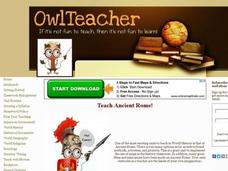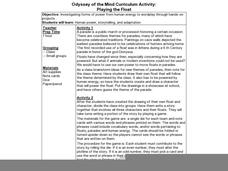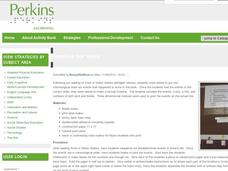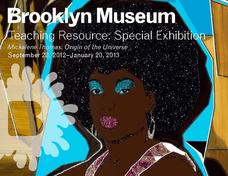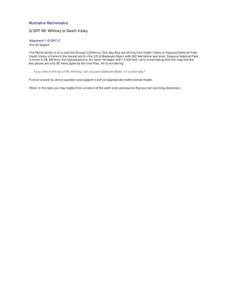California Academy of Science
How Big is Big?
In a math or life science class, "mini-me" models are created with cardstock to reflect a 1:10 scale of students' bodies. Learners measure each others' heights with meter sticks, and then reduce the size by 10. After this exercise, they...
California Academy of Science
Greening Your Middle School
Middle schoolers redesign their school to make it more energy efficient, and create a model of their design. Learners get together in groups of 5, and they take on the task of making their school more energy efficient. To do this, they...
National Geographic
Rescuing, Relocating, and Rehabilitating Wildlife
Bring up the Deepwater Horizon (BP) oil spill that occurred in the Gulf of Mexico in 2010. Display the colorful diagram of the coastal and marine organisms living in the area. Show a video about relocating the eggs of the Gulf's sea...
National Geographic
Sea Turtles and the Gulf of Mexico Oil Spill
There are seven species of sea turtles, five of which live in the Gulf of Mexico. Young scientists learn about each and then examine the impact of the Deepwater Horizon (BP) oil spill on the populations. A video, Internet links to sea...
Odyssey of the Mind
Odyssey of the Mind Curriculum Activity: GREAT TO COMMUNICATE
Humans love to communicate and they do it in so many different ways. The class investigates how people have used new inventions and technological innovations to communicate. They are divided into groups of three or four and given the...
Odyssey of the Mind
Odyssey of the Mind Curriculum Activity: Mathematicus Dramaticus
The best part about this resource is that you've got four wonderful activities to choose from. Each of the projects can work together or on its own to help learners understand the history of math and how it can be seen every day. In...
Odyssey of the Mind
Odyssey of the Mind Curriculum Activity: Performing Arts
The classical arts have made a lasting impact on our society and your advanced learners get to find out why. The activity starts as the children create a list of the arts found in society, they discuss how these art forms impact their...
National Geographic
Hydroelectric and Geothermal: Benefits and Drawbacks
Take a closer look at hydroelectric and geothermal energy with your physical science class. Do the benefits really outweigh the costs to the surrounding areas? After doing some reading about each, small groups discuss and create a...
Odyssey of the Mind
Odyssey of the Mind Curriculum Activity: Making of a Monster
Over the course of a week, the class will study how monsters are portrayed throughout literature. But why? Monsters in science fiction or horror often depict the darker side of human nature; they are described for their horrific physical...
Owl Teacher
Teach Ancient Rome!
Teaching the class about Ancient Rome can be fun for you and for them! Check out this incredible resource that has everything you need to bring ancient Roman civilization back to life. Begin by scrolling to the bottom of the page and...
Odyssey of the Mind
Odyssey of the Mind Curriculum Activity: Extend-sive Thinking
Can knowing about things of the past help predict the types of things seen in the future? Advanced learners consider the idea that things extend. In other words, concrete things like bridges and intangible things like ideas extend from...
Odyssey of the Mind
Odyssey of the Mind Curriculum Activity: Playing the Float
Got a rainy day and need a few fabulous activities to foster creative thinking skills? The class works to understand the three types of human power; direct, indirect, and stored. They do this by first creating a parade float like the...
Odyssey of the Mind
Odyssey of the Mind Curriculum Activity: Digging for Clues
Make critical and creative thinkers out of your class, with an archeology-based project they'll love. They start the activity by first researching what archeologists do, then they generate a list of the qualities archeologists need to be...
Creative Competitions, Inc.
Odyssey of the Mind Curriculum Activity: Fantastic Fairy Tale
Learning about literature can be so much fun; it can also be made more accessible through projects and dramatic play. As they explore theme, character, and setting, the class gets creative and makes a dramatic recreation of a classic...
Perkins School for the Blind
Timeline for Anne
It is key to the learning process to make everything a child with visual impairments does as tactile as possible. After reading Anne of Green Gables, the class discusses her life events in order to make a tactile time line. They choose...
Perkins School for the Blind
Tactile quilts that tell a story
Learners with multiple disabilities need to engage in projects that push them to know their full potential. They need to be able to express themselves in a variety of ways, and this very thoughtful lesson plan does just that. They make a...
MDE k-12
Lesson 5: The Journey Becomes Larger Than Life!
Many muralists throughout history have focused on using their art to represent aspects of their culture or community. After thoroughly researching several muralists, budding artists will create a larger than life mural that contains...
Brookly Museum
Mickalene Thomas: Origin of the Universe
Modern art is great to experience because it brings contemporary issues into everyday conversation. Upper graders consider the work of Mickalene Thomas, an artist that uses photo collage techniques to capture the beauty of African...
Shakespeare Uncovered
All the Globe’s a Stage: Shakespeare’s Theatre
“All the world’s a stage,” exclaims Jaques in As You Like It, but it is the structure of the Globe stage and how that structure influenced Shakespeare’s plays that is the focus of an on-line research project. Class members visit a series...
Curated OER
Mt. Whitney to Death Valley
This is an intriguing problem that brings together real-world data, technology, and mathematical problem solving. If visibility wasn't an issue, could you see from the highest point in the lower 48 states, Mt. Whitney, to the lowest...
Teach Engineering
You've Got to See it to Believe It!
Youngsters develop an understanding of how smog is produced, and how exhaust from automobiles is one of the major sources of smog. They explore the roles that engineers play in developing technologies that reduce smog, then work in teams...
Virginia Department of Education
Researching Information
Give your junior high researchers a clear concept of how to go about starting their research paper with the resources available in this exercise. Students develop an idea to research, and spend time in the library or computer lab...
Denver Art Museum
Lesson: Act 1: Purple Bathrobes Attend and Opera
I really like this idea. Upper graders discover the connection between art and theatre by first analyzing the artists' choices and motivation in creating the installation piece, Four Purple Velvet Bathrobes. In groups, they write one-act...
Denver Art Museum
Lesson: Facebook for a Prince
In 1538 a portrait and a praise poem were created in honor of Edward, Prince of Wales. Your class will analyze the poem and painting, research the life of young Edward, then use the information to create a Facebook page. They will...











